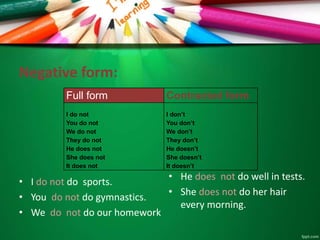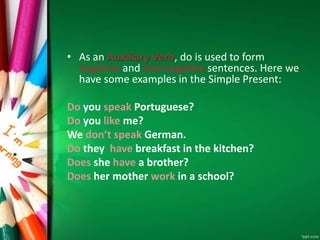Do
- 1. The verb to do Vamos aprender o verbo to do.
- 2. DO é um verbo especial. Pode ser usado como um verbo qualquer. Pode ser usado como um verbo auxiliar, um verbo que , associado a outros verbos, serve para construir formas negativas e interrogativas desses mesmos verbos.
- 3. Agora, vais seguir as explicações em inglês. É fácil: • All English verbs have two forms in the Simple Present, except the verb Be and a set of verbs called Modal verbs which we will study later. • DO follows the general rule: do does I do You do He does We do It does They do She does
- 4. Affirmative form: • I do sports. • You do gymnastics. • We do our homework • He does well in tests. • She does her hair every morning.
- 5. Negative form: • I do not do sports. • You do not do gymnastics. • We do not do our homework • He does not do well in tests. • She does not do her hair every morning. Full form Contracted form I do not You do not We do not They do not He does not She does not It does not I don’t You don’t We don’t They don’t He doesn’t She doesn’t It doesn’t
- 6. • As an Auxiliary Verb, do is used to form negative and interrogative sentences. Here we have some examples in the Simple Present: Do you speak Portuguese? Do you like me? We don’t speak German. Do they have breakfast in the kitchen? Does she have a brother? Does her mother work in a school?
- 7. Interrogative sentences • Do / Does + subject + verb • Do you walk to school? • Does she have a pet? • Do they drink milk? Negative sentences • Subject + do not (don’t) + verb • I don’t walk to school. • She doesn’t have a pet. • They don’t drink milk.
- 8. Further examples • Mary drinks coffee, she doesn’t drink tea • I’m sorry, I don’t have any change. • I don’t walk to school. • She doesn’t have a pet. • They don’t drink milk.








